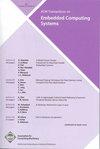同步共享内存和模型检查
IF 2.8
3区 计算机科学
Q2 COMPUTER SCIENCE, HARDWARE & ARCHITECTURE
引用次数: 0
摘要
本文在Spin模型检查器中实现了同步系统中确定性并发定义和推理的形式化通用框架。具体来说,本文实现了时钟同步共享内存(csm)理论,将同步编程扩展到更多更高级别的csm数据类型。这些csm数据类型配备了一个同步策略,该策略规定了必须如何组织对对象方法的并发调用。在策略构建系统中,每个对象的所有方法都可以以符合策略的方式进行调度,而不会出现死锁。在我们的框架中,同步策略被编码为Promela never-claims。在这种形式中,模型检查器可以搜索满足所有未声明的同步产品的执行(交错),即所有csm对象的策略一致性调度。这种符合策略的调度的存在,验证了并发同步系统是确定性的。本文的方法超越了单一语义,因为它可以处理同步编程模型以及文献中发现的各种形式的顺序构造模型。本文章由计算机程序翻译,如有差异,请以英文原文为准。
Synchronised Shared Memory and Model Checking
In this paper, a formal generic framework for defining and reasoning about deterministic concurrency in synchronous systems is implemented in the Spin model checker. Concretely, the paper implements the clock-synchronised shared memory ( csm ) theory , which extends synchronous programming with more and higher level csm data types. These csm data types are equipped with a synchronisation policy prescribing how concurrent calls to objects methods must be organised. In a policy constructive system, all methods of every object can be scheduled in a policy-conformant manner without deadlocking. In our framework, synchronous policies get codified as Promela never-claims. In this form, the model checker can search for executions (interleavings) that satisfy the synchronous product of all the never-claims, namely policy-conformant schedules for all the csm objects. The existence of such a policy-conformant schedules, verifies that the concurrent synchronous system is deterministic. The approach of this paper extends beyond a single semantics since it can handle the synchronous programming model as well as the various forms of the sequentially constructive model found in the literature.
求助全文
通过发布文献求助,成功后即可免费获取论文全文。
去求助
来源期刊

ACM Transactions on Embedded Computing Systems
工程技术-计算机:软件工程
CiteScore
3.70
自引率
0.00%
发文量
138
审稿时长
6 months
期刊介绍:
The design of embedded computing systems, both the software and hardware, increasingly relies on sophisticated algorithms, analytical models, and methodologies. ACM Transactions on Embedded Computing Systems (TECS) aims to present the leading work relating to the analysis, design, behavior, and experience with embedded computing systems.
 求助内容:
求助内容: 应助结果提醒方式:
应助结果提醒方式:


